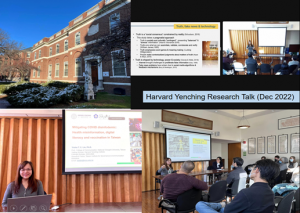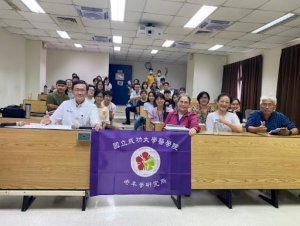As a master’s student at National Chengchi University, I took a class on cross-strait relations between China and Taiwan. For my final essay, I became interested in the question, how has Taiwan’s democratization, and China’s lack thereof, affected cross-strait relations?
My own experiences of China and Taiwan galvanized my curiosity. Before coming to Taiwan with the Fulbright Program, I spent two years in mainland China teaching English, one year at a middle school in Hunan province, and one year at a university in Henan province. In both settings, nationalism was a daily routine. In middle school, when the national anthem played on loudspeakers twice a day, all students stopped in their tracks and remained still to listen. Only after it ended would they continue their walk to the canteen. At the university, signs extolled the accomplishments of China since the Chinese Communist Party came to power in 1949, and even urged students to follow the example of Lei Feng, a young People’s Liberation Army hero of the Maoist era known for humility, kindness to fellow comrades, and devotion to the Communist Party.
During my two years in China, I traveled widely and visited many history museums. They all seemed to have at least a few exhibits dedicated to detailing the horrors inflicted on China by imperialist powers in the past and warning against Western values. I never saw a protest in China. Many nights, I watched the CCTV’s nightly news broadcast. It seemed to always feature several distinct themes: local officials are busy and competent; the common people are becoming wealthier; the outside world is dangerous; and Xi Jinping is meeting with foreign leaders.
Taiwan offers a stark contrast. Nearly every month, I read about a major political protest in Taipei. I attended Taipei’s annual gay pride parade, Asia’s largest, where an estimated [1] 123,000 people marched in 2017. At frequented public spaces like the Taipei 101 building courtyard, or the entrance to Taroko National Park, I commonly saw petitioners for Falun Dafa, the spiritual group banned in China by the Communist Party in 1999. The news media is free and vibrant, although sometimes featuring excessive coverage of mundane local issues like traffic accidents and restaurant openings. Major museums, such as the Sun Yat-sen Memorial Hall and the National 228 Memorial Museum, promote democracy as vital and compatible with traditional Chinese culture. In 2018, Taiwan opened a museum on Green Island dedicated to human rights. These institutions unblinkingly acknowledge crimes committed by the government in the past.
This jarring juxtaposition traces back to the late 1980s, when Taiwan began a process of political liberalization, and China did not. In 1987, Taiwan’s President Chiang Ching-kuo lifted martial law, allowing civil society and opposition political parties to emerge. By contrast, in response to pro-democracy demonstrations in Beijing’s Tiananmen Square in 1989, the Communist Party carried out a massacre of protesters and tightened its authoritarian control.
In my research, I sought to answer the question, has Taiwan’s democratization made its relationship with mainland China better or worse? My main takeaway was that the effect of Taiwan’s democratization on cross-strait relations was not static but rather changed over time.
Early flare-ups such as the 1995-1996 Taiwan Strait Crisis and cross-strait turbulence during Chen Shui-bian’s presidency indicated a plummet in China-Taiwan relations. As time progressed, though, Taiwan’s democracy strengthened the status quo rather than leading to an immediate declaration from Taiwan of formal independence. This allowed China to ease up its pressure on Taiwan and take a more accommodating position. Relations between China and Taiwan then experienced significant warming, culminating in many agreements penned during Ma Ying-jeou’s presidency. However, this equation may not always hold true for the future, because if China’s military continues to expand its capabilities to the point where coercing Taiwan into submission is possible, then Taiwan’s democratic nature may not ease cross-strait relations but rather cause them to worsen. Developments on the ground in both Taiwan and China suggest that political unification in the near future would be a painful process for both sides. What follows is a selection of passages from my essay.
In order to properly understand the implications democracy had for Taiwan, one must first briefly examine what preceded it. Even before Chiang Kai-shek and the Kuomintang (KMT) arrived in Taiwan after fleeing mainland China, social unrest had reached levels of crisis. After the Japanese withdrawal from the island after World War II, local inhabitants grew aggravated at perceived corruption and mistreatment at the hands of KMT forces. A dispute involving a cigarette vendor and a policeman escalated into a full-blown revolt that was brutally crushed by the KMT. The massacre began on February 28, 1947, and claimed the lives of up to 25,000 civilians[2].
For roughly the next 40 years, the KMT gripped Taiwan firmly under martial law. This period, from about 1947 to 1987, is known in Taiwanese history as the White Terror. According to BBC journalist Cindy Sui, “Tens of thousands of people suspected of being anti-government were arrested, and at least 1,200 executed, between 1949 and 1992.” During this period, especially in the early years, Taiwan’s government held firm to the idea that the KMT would eventually retake the mainland. Chinese nationalism was a mainstay of the education system and propaganda apparatus. While the Chinese Communist Party (CCP) and the KMT were at each other’s throats over who was the rightful ruler of China, they did both agree that Taiwan and the mainland were part of the same motherland.
This common ground was later threatened during the early stages of Taiwan’s democratization, as a distinct Taiwanese identity emerged. This caused relations with China to deteriorate. “[In] the 1990s, the mass psychology in Taiwan was undergoing a gradual but steady shift away from Chinese nationalism towards a new Taiwanese national identity,” (Wu 2005, 37). Public opinion polls confirmed this transformation, in which more and more people saw themselves as Taiwanese rather than Chinese (Ho and Liu 2003, 149-183). Taiwan’s liberalization, led in the 1990s by Lee Teng-hui, “provided the institutional space for airing nativist messages and agitating for separatist goals,” (Wu 2005, 36). China was not happy. In 1995-1996, it fired missiles around Taiwan to protest Lee Teng-hui’s visit to Cornell and coerce Taiwan’s electorate. The U.S. then sent its own naval warships into the region in a show of solidarity. The 1996 election resulted in Lee Teng-hui becoming president. The voter turnout was estimated at 76 percent. This series of events displays a worsening of relations between Taiwan and China during the early years of Taiwan’s democratization.
As the years passed, however, Taiwan did not declare formal independence. This allowed cross-strait trepidation to dissipate. This inclination to stay within the status quo was due to public opinion. Taiwanese voters went to the polls juggling their identity and interests (Wang, Chen, & Keng 2010, 180). While many believed their own identity as Taiwanese was important, they also cherished peace and prosperity, which would be jeopardized should Taiwan declare formal independence. Economic ties with China were also seen as important. “Most voters opposed the [Democratic Progressive Party’s] position when it came out in favor of independence in 1991,” (Rigger 2001, 11). Being a democracy, Taiwan’s politicians had to maximize votes (Wu 2000, 417). It was not prudent, therefore, for political parties in Taiwan to radically favor either formal independence or unification. “Election oriented leaders have moved their parties away from highly polarized positions on the national identity issue, towards more centrist positions [status quo]” (Fell 2005, 85). This preference for the status quo continues. In 2016, the Taiwan Brain Trust conducted a survey and found that 79.8 percent of Taiwan’s population supported maintaining the status quo[3].
As the status quo endured through Taiwan’s political transformation, the CCP shifted to a more accommodating position. “Beijing’s bottom line remains that so long as the voters of Taiwan are deterred from voting for independence, democratization can be accommodated within the strategy of ‘peaceful unification,’” (Hughes 1999, 134). Beijing’s softened stance came about in part due to interactions with Taiwan’s KMT party. “Pan-KMT actors persuaded Beijing that its coercive approaches had alienated the Taiwanese people and that a conciliatory approach might win their hearts and minds,” (Wei 2016, 67). From 2008-2016, Taiwanese President Ma Ying-jeou led initiatives that allowed cross-strait relations to be, “characterized not only by stability but also by substantial warming, including the signing of a landmark free trade area-like agreement (the Economic Cooperation Framework Agreement ) and more than a dozen other accords on commercial and financial issues,” (DeLisle 2011, 1).
Tsai Ing-wen of the Democratic Progressive Party (DPP) came to power in 2016 on a platform of securing Taiwan’s de facto autonomy. But Taiwan had already become largely dependent on China economically, and the “Three Links” of travel, trade, and post were already operating. She did not find it wise to call for formal independence.
China subsequently cut official dialogue with Taiwan but stopped short of severing economic ties. This seems to be a tactic by the CCP to, “differentiate between how it treats the people of Taiwan, whom it is courting, and how it treats the authorities, whom it seeks to pressure,” (Romberg 2017, 1). For now, the status quo has been strengthened, which has led to a cross-strait scenario of, “loss aversion, that is, a reluctance to take risks because the potential damage is more salient than gain,” and “a preference for reacting rather than initiating,” (Huang & James 2014, 671-672). Yu-Shan Wu argued that a strategic triangle is in play that protects the status quo, “because the three main actors in the Taiwan Strait—the United States, Taiwan, and mainland China—are conditioned by the strategic triangle and their domestic politics and hence would refrain from making provocative declarations or using force,” (Wu 2001, 156).
The future, though, is in question. China is intent on one day changing the status quo, and has not given up the threat of military action to do so. If China’s military continues to grow in strength to the point where it could take Taiwan by force and deter American intervention, then Taiwan’s status as a democracy would likely do little to benefit cross-strait relations.
“From Beijing’s perspective, Taiwan’s democratic government—an alternative to the [Chinese] authoritarian model—presents an existential challenge to the legitimacy of the Chinese Communist Party (CCP) and its monopoly on domestic political power,” (Stokes and Tsai 2016, 3). Taiwan, likewise, takes a hostile approach to China’s political culture. As Ian Easton argues, “The Taiwanese are fiercely protective of their hard-won freedoms and rightfully proud of their democracy,” (Easton 2016, 3).
Events on the ground in Taiwan deepen this viewpoint. In early December 2017, Taiwan’s Legislative Yuan passed The Act on Promoting Transitional Justice, which aims to rid the island of symbols of its authoritarian past and investigate crimes committed by the KMT government prior to Taiwan’s democratization.[4] And even the KMT, who have criticized the transitional justice bill as a witch hunt[5], agree on the importance of human rights. In a March 2017 interview with Jerome A. Cohen, a legal scholar who specializes in China and the rule of law, former KMT Taiwanese president Ma Ying-jeou talked with pride about Taiwan’s initiatives on human rights since democratization[6]. If China were to coerce Taiwan to politically unify, it would face opposition from both of Taiwan’s major political parties, the DPP and the KMT, regarding any steps in a direction that would erode human rights.
Conversely, China under Xi Jinping has grown increasingly authoritarian. The U.S. Congressional-Executive Commission on China’s (CECC) annual report for 2017 highlights deterioration in the areas of civil society, rule of law, religious freedom, and Hong Kong’s relative freedoms (CECC 2017, 5). Xi Jinping’s name and ideology were enshrined into the country’s constitution during the 19th Party Congress, making him the most deified leader of China since Mao[7]. Human rights lawyers are literally disappearing[8]. After jailing feminist activists in 2015[9], China has, through internet censors, deleted #metoo social media posts in which women spoke about experiences of sexual misconduct[10]. Xinjiang, the Western province home to the Uighurs and several other Muslim ethnic minorities, has become a virtual surveillance state, as the government uses a local separatist movement as a pretext to roll out state of the art surveillance tools in what human rights activists say is a massive infringement on privacy[11]. Maya Wang, a researcher based in Hong Kong for Human Rights Watch, told the South China Morning Post that this is the worst time in China for human rights since the 1989 Tiananmen Square massacre[12]. Under these conditions, Taiwanese society will likely reject any move towards political unification with the mainland.
*The views expressed in this article are those of the author and do not reflect the official policy or position of the U.S. government or Foundation for Scholarly Exchange.
Editor: Tiffany Huang
References
Sui, Cindy. “Taiwan Kuomintang: Revisiting the White Terror years.” BBC News, BBC, 13 Mar. 2016, www.bbc.com/news/world-asia-35723603.
Wu, Yu-Shan. “Taiwan’s Domestic Politics and Cross-Strait Relations.” The China Journal, no. 53, 2005, pp. 35–60, JSTOR, ww.jstor.org/stable/20065991.
Szu-yin Ho and I-chou Liu. “The Taiwanese/Chinese Identity of the Taiwan People in the 1990’s.” in Wei-chin Lee and T. Y. Wang (eds), Sayonara to the Lee Teng-hui Era, Lanham: University Press of America, 2003, pp. 149-183.
T. Y. Wang, Lu-huei Chen, and Shu Keng. “Symbolic Politics, Self-Interests, and Threat Perceptions: An Analysis of Taiwan Citizens’ Views on Cross–Strait Economic Exchanges.” In Wei-Chin Lee (ed), Taiwan’s Politics in the 21st Century, World Scientific Publishing Co. Pte. Ltd., London, 2010, pp. 159-184.
Rigger, Shelley. From Opposition to Power: Taiwan’s Progressive Party. Lynne Rienner Publishers, Inc., 2001.
Wu, Yu-Shan. “Theorizing on Relations across the Taiwan Strait: Nine contending approaches.” Journal of Contemporary China, 9:25, 2000, pp. 407-428, DOI: 10.1080/713675943
Fell, Dafydd. Party Politics in Taiwan: Party Change and the Democratic Evolution of Taiwan, 1991-2004. Routledge, 2005.
Cheng, Hung-ta and William Hetherington. “Majority says Taiwan is independent.” Taipei Times, www.taipeitimes.com/News/front/archives/2016/10/29/2003658136.
Hughes, C.R. “Democratization and Beijing’s Taiwan Policy.” In: Tsang S., Hung-mao T. (eds) Democratization in Taiwan. St Antony’s. Palgrave Macmillan, London, 1999, pp. 130-147.
Wei, Chi-hung. “China–Taiwan relations and the 1992 consensus, 2000−2008.” International Relations of the Asia-Pacific, Volume 16, Issue 1, 1 January 2016, pp. 67–95.
Zhao, Quansheng and Liu, Guoli. “Beijing’s Shifting Positions in the New Era of Cross-Taiwan Strait Relations.” in Wei-Chin Lee (ed), Taiwan’s Politics in the 21st Century, World Scientific Publishing Co. Pte. Ltd., London, 2010, pp. 185-225.
DeLisle, Jacques. “Strait Ahead? China’s Fifth Generation Leaders and Beijing’s Taiwan Policy.” Foreign Policy Research Institute, July 2011.
“Full text of President Tsai’s inaugural address | Politics | FOCUS TAIWAN – CNA ENGLISH NEWS.” FOCUS TAIWAN, focustaiwan.tw/news/aipl/201605200008.aspx.
郭凯. “One-China principle reiterated after speech.” Chinadaily.Com.cn, www.chinadaily.com.cn/china/2017-10/27/content_33759481.htm.
Romberg, Alan. “Cross-Strait Relations: Marking Time.” China Leadership Monitor, no. 53, May 25, 2017.
Huang, Chin-Hao and James, Patrick. “Blue, Green or Aquamarine? Taiwan and the Statue Quo Preference in Cross-Strait Relations.” The China Quarterly, vol. 219, Sept. 2014, pp. 670–692.
Wu, Yu-Shan. “Does Chen’s Election Make Any Difference? Domestic and International Constraints on Taipei, Washington, and Beijing.” In Muthiah Alagappa, ed., Taiwan’s Presidential Politics: Democratization and Cross-Strait Relations in the Twenty-First Century, Armonk, NY: M. E. Sharpe, 2001, pp. 155-92.
Easton, Ian. “Strategic Standoff: The U.S.-China Rivalry and Taiwan.” Project 2049 Institute, Mar. 2016, www.project2049.net/documents/Strategic%20Standoff_US_China_Rivalry_Taiwan.pdf.
Stokes, Mark, and Sabrina Tsai. “The United States and Future Policy Options in the Taiwan Strait: Driving Forces and Implications for U.S. Security Interests.” Project 2049 Institute, 1 Feb. 2016, www.project2049.net/documents/160130_%20ALTERNATE_FUTURE_POLICY_OPTIONS_IN%20_THE_TAIWAN_STRAIT.pdf.
Shih, Hsiu-chuan. “Tsai to pledge to ‘better Taiwan’ in National Day speech.” The China Post, 10 Oct. 2017, chinapost.nownews.com/20171010-157585.
Lin, Sean. “Lawmakers pass transitional justice act.” Taipei Times, www.taipeitimes.com/News/front/archives/2017/12/06/2003683504.
Hsu, Stacy. “KMT chairwoman says DPP is on a ‘witch hunt’.” Taipei Times, www.taipeitimes.com/News/taiwan/archives/2016/11/28/2003660152.
Asia Society. “A Conversation With Ma Ying-Jeou.” YouTube, YouTube, 2 Mar. 2017, www.youtube.com/watch?v=afKg1V47fFk&t=1731s.
Gerber, Abraham. “Most view ‘two systems’ as failure: poll.” Taipei Times, www.taipeitimes.com/News/taiwan/archives/2017/07/01/2003673655.
Tan, Huileng. “Taiwan watches as China closes in on Hong Kong.” CNBC, CNBC, 19 July 2017, www.cnbc.com/2017/07/19/taiwan-watches-as-china-closes-in-on-hong-kong.html.
United States, Congress, “Congressional- Executive Commission on China: Annual Report.” 2017.
BBC News. “Xi Jinping ‘most powerful Chinese leader since Mao Zedong’ – BBC News.” YouTube, YouTube, 24 Oct. 2017, www.youtube.com/watch?v=E_Y9yQaE89E.
Luu, Chieu, and Matt Rivers. “The disappeared: Accounts from inside China’s secret prisons.” CNN, Cable News Network, 3 Dec. 2017, edition.cnn.com/2017/11/23/asia/china-lawyers-disappeared/index.html.
Rauhala, Emily. “China Jails Five Feminists for Activities the Communist Party Supports.” Time, time.com/3750389/china-feminists-international-womens-day-wu-rongrong-wei-tingting-wang-man-zheng-churan-li-tingting/.
Lau, Mimi and Zuo, Mandy. “#MeToo? Silence, shame and the cost of speaking out in China.” South China Morning Post, 9 Dec. 2017, www.scmp.com/news/china/society/article/2123481/metoo-silence-shame-and-cost-speaking-out-about-sexual-harassment.
Chin, Josh, et al. “Twelve Days in Xinjiang: How China’s Surveillance State Overwhelms Daily Life.” The Wall Street Journal, Dow Jones & Company, 19 Dec. 2017, www.wsj.com/articles/twelve-days-in-xinjiang-how-chinas-surveillance-state-overwhelms-daily-life-1513700355.
“Human rights under Xi ‘worst since Tiananmen crackdown’: Amnesty.” South China Morning Post, via Associated Press, 17 Nov. 2017, www.scmp.com/news/china/policies-politics/article/2120318/human-rights-china-under-xi-jinping-worst-tiananmen.







